
Author Archives: Wil Catlin
0 Thank you Ben Butcher, CEO of STAG Industrial for joining the BRA Morning Zoom
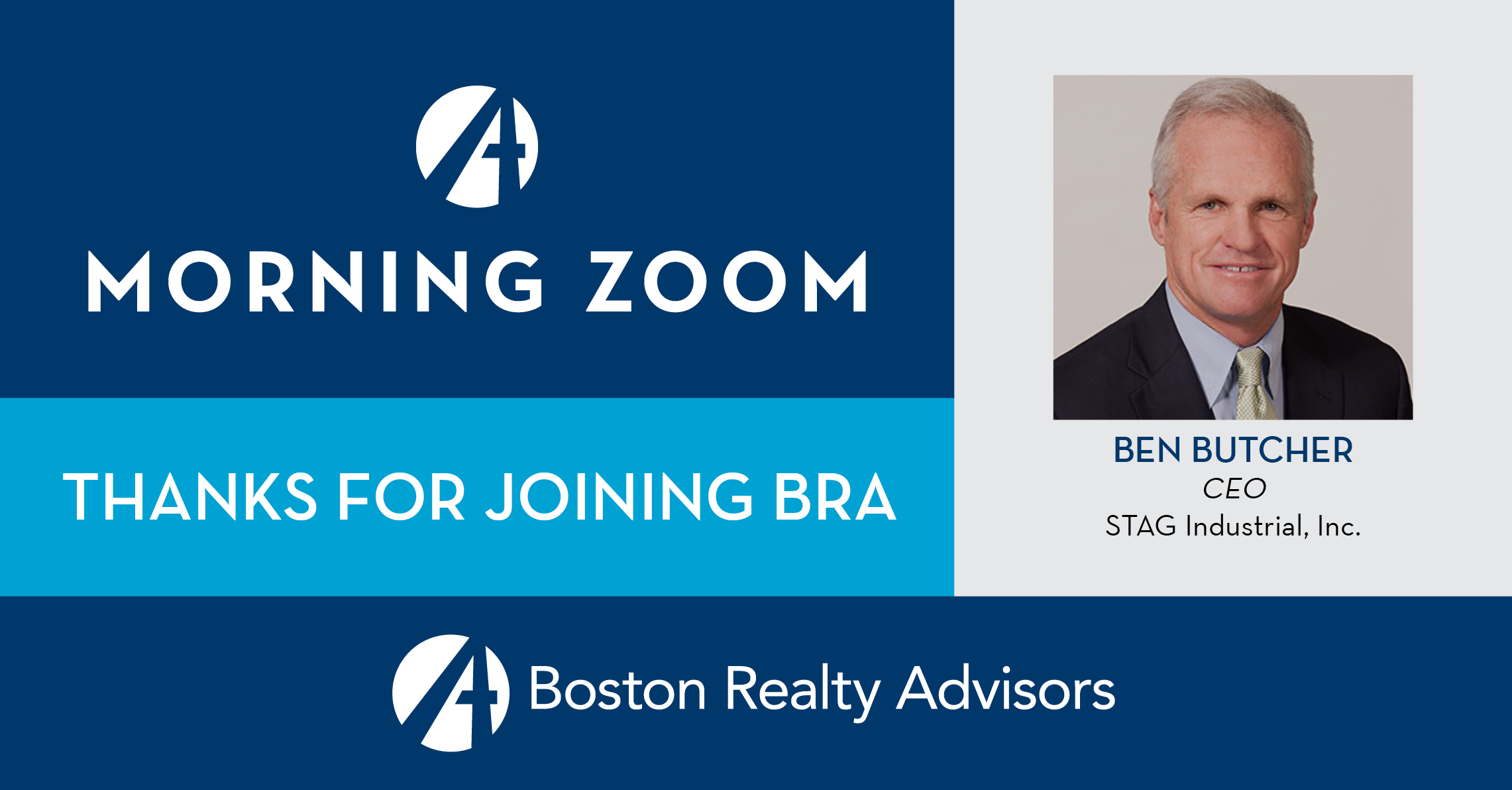
Thank you Ben Butcher, CEO of STAG Industrial for joining our Morning Zoom.
- Mr. Butcher provided a quick overview of the STAG portfolio and shared that they focus on speed to market, optionality, and cashflow. They are a big believer in “boots on the ground” and augment their asset management efforts by hiring local and best-in-class property managers, as well as local brokers to lease their assets in all 38-states.
- He said that he’s extremely optimistic about the future of STAG, mentioning that they own assets equal to about 1.5% of their target market, and thus have a lot of room for growth. He added that moving forward, they believe that finding secured loans will be difficult, this will limit the participation of small buyers from most deals.
- STAG does not offer data storage nor cold storage. Their portfolio mostly caters to single-tenant supply chain companies, like Amazon. Mr. Butcher predicts a continued shortening and clogging of the supply chain as well as manufacturing coming back onshore – creating more of a need for logistical space generally.
- He reminded the attentive audience that in order to consider a facility for last-mile fulfillment, the building has to have the ability to receive the product from 18-wheel trucks.
- Ben stressed the importance of engaging employees via social causes and charitable organizations – a valuable part of developing the corporate culture.
Book Recommendation – The Boys in the Boat: Nine Americans and Their Epic Quest for Gold at the 1936 Berlin Olympics
0 ALL THE DOMINOS FALL’ Business debts are threatening a cascade of loss
It was 5 p.m. on the Friday before April 1 when John Pepper finally picked up the phone to speak with one of his restaurant chain’s landlords. Pepper, the co-founder and former CEO of Boston-based Boloco, hadn’t wanted to answer the call.
Luckily, it was good news — the landlord would be forgiving Boloco’s rent from March 15 through May 31.
“She is no longer a ‘landlord,’” Pepper wrote on Twitter. “She and her incredible organization are a partner.”
April 1 arrived last week, and with it, a huge amount of uncertainty regarding how commercial tenants and landlords are handling rent payments amid the coronavirus pandemic that has shuttered businesses across the globe.
Many landlords are loath to discuss whether they’re asking tenants to pay in full. Several of Boston’s biggest property owners and managers wouldn’t respond to questions about the situation. On the other side, tenants have reported mixed reactions from landlords. Some businesses are being offered 50% off rent for the next three months, others are receiving full deferral of rent for the next three months, and still others are seeing rent forgiven for now, but having it tacked onto the end of a lease term.
Amid such confusion, there’s the $2.2 trillion federal relief package — and with it, the $349 billion Paycheck Protection Program — but there are still big questions about when and how small businesses can tap into those funds.
And in the meantime, some landlords either cannot — or will not — offers deals on rent payments.
“I’ve heard those stories: ‘I have no choice, I have to pay my lender. You have to pay me or I’ll breach my covenant, or I won’t be able to pay my own mortgage,’” Pepper said in an interview with the Business Journal. “The lenders really have to work with the landlords right now, or the lender will be responsible for a lot of businesses closing. When a landlord says, ‘You have to pay me,’ and there’s no money from which to be paid, nothing works. All the dominoes fall.”
‘Behind the tidal wave’
Retail, hospitality and restaurant tenants were the first to feel the brunt of the shutdowns, but the office market is also taking a hit, said Michael Scott, co-managing partner of law firm Nutter in Boston.
Businesses with more cash on hand than those in retail or food and beverage typically are in a better position to be able to pay rent. For example, Boston-based STAG Industrial, a real estate investment trust that owns and operates a 91.4 million-square-foot portfolio of mostly industrial assets, says “less than 5% of tenants have requested rent relief” amid the coronavirus pandemic. The real estate investment trust says it’s engaging in “ongoing discussions to understand financial situation and impact” with its 414 tenants, who are primarily in single-user industrial properties, according to its most recent annual report.
Boston-based real estate firm Hudson Group is taking steps to ease the economic burden its tenants are feeling amid the pandemic — including forgiving April rent in some cases, says company principal Noam Ron.
Hudson Group is a midsize firm with a portfolio comprising several smaller retail tenants and several residential buildings — including Radian at 120 Kingston St. in Boston, which has restaurant Stillwater on its ground floor. Ron says the firm’s size means that, while it can be flexible on rent, it’s not a giant corporation that can absorb several months of losses.
“If all we’re doing is chipping away at these things, we’re behind the tidal wave that’s coming this summer. And that’s pretty scary,” Ron said. “We’re talking about flattening the curve now, as we should be. But the curve of the stimulus and the curve of our economic response is going to be flat unless we deal with it now.”
Forbearance
Landlords are only a part of the equation, Ron says. Often, it’s not up to a landlord to decide whether a rent payment is due; they need to work out arrangements with their lenders to pay their mortgages.
“The word of the day when it comes to debt is ‘forbearance,’” said Josh Bowman, an attorney who chairs the hospitality group at law firm Sherin and Lodgen LLP in Boston. “A lot of landlords have already gone to their lenders, and a lot of their lenders have already proactively sought out their borrowers, and they’ve already started to modify loan terms so landlords don’t have to pay their debt in April. It’s all a big, connected chain.”
There are typically two types of lenders, Bowman says: a balance sheet lender, which holds a loan on its own balance sheet and doesn’t sell to anyone else, and a commercial mortgage-backed securities lender, which sells a loan to a trust owned by bond holders and Wall Street investors.
Many local balance-sheet lenders are already taking steps to work out forbearance agreements to allow borrowers to temporarily defer on its debt service payment.
But it’s a different story with commercial mortgage-backed securities. A Business Journals analysis of the national commercial real estate market has identified 4,600 properties securing $30 billion in CMBS debt coming due in the next six months. Many of the borrowers in those loans will want to seek workouts — or modifications to the terms — in coming weeks, but it’s a complex process.
“If you have a CMBS loan, there are no workouts going on yet,” Bowman said. “It takes much longer for a CMBS lender to get into a workout, because they have to first refer the loan to a special servicer. The master servicer — which is the person who normally just collects the money on the loan — has no power to do any kind of workout.”
The International Council of Shopping Centers, one of the largest real-estate industry groups in the world, on March 31 formally requested the federal government to require lenders — including holders of commercial mortgage backed securities — to temporarily forbear on debt obligations for retailers.
“The long-term strength of the shopping center industry is critical to the economic, civic and social viability of communities across the nation,” wrote Tom McGee, the ICSC president and CEO, in the March 31 letter. “Our entire industry is at risk if action to support it is not taken.”
A downside of placemaking
For years, Boston developers have touted the benefits of placemaking — creating places where people want to be, and experiences that people want to have, as a way to draw in consumers to spend money in person and not online. As a result, nearly every new development in the city has had some form of restaurant or retail space on its ground floor.
With those spaces nearly all closed now, it affects the rest of the office or residential space, said Wil Catlin, managing partner of Boston Realty Advisors.
“That retail gets dark, the window gets broken, it’s dark, you don’t feel good going into the building. You’re going to remember that landlord, and did the landlord do the right thing?” he said.
Catlin and Jason Weissman, the firm’s senior partner, say that many landlords are working with tenants on a case-by-case basis, trying to be mindful of long-term relationships.
Tenants worry that, without immediate significant help, Bostonians could return to a city where nearly every ground floor tenant is boarded up, or like New York’s Upper East Side, where many vacancies end up getting filled with a Duane Reade pharmacy or a bank, said Josh Childs, who opened Trina’s Starlite Lounge in Somerville and Audubon in Boston.
“This is what is the vibrancy of the city is in the first place. Do we want to be become a corporate strip area, or do we want to have interesting places that reflect the diversity of the community?” Childs said. “We will get through this, and at the end of it, the people who have worked together and thoughtfully trying to make it a better situation for everyone will be not only remembered for doing so, but also remunerated economically. That, I think, will be the success of this down the road.”
0 Thank you Adam Baur from Northwestern Mutual for joining the BRA Morning Zoom
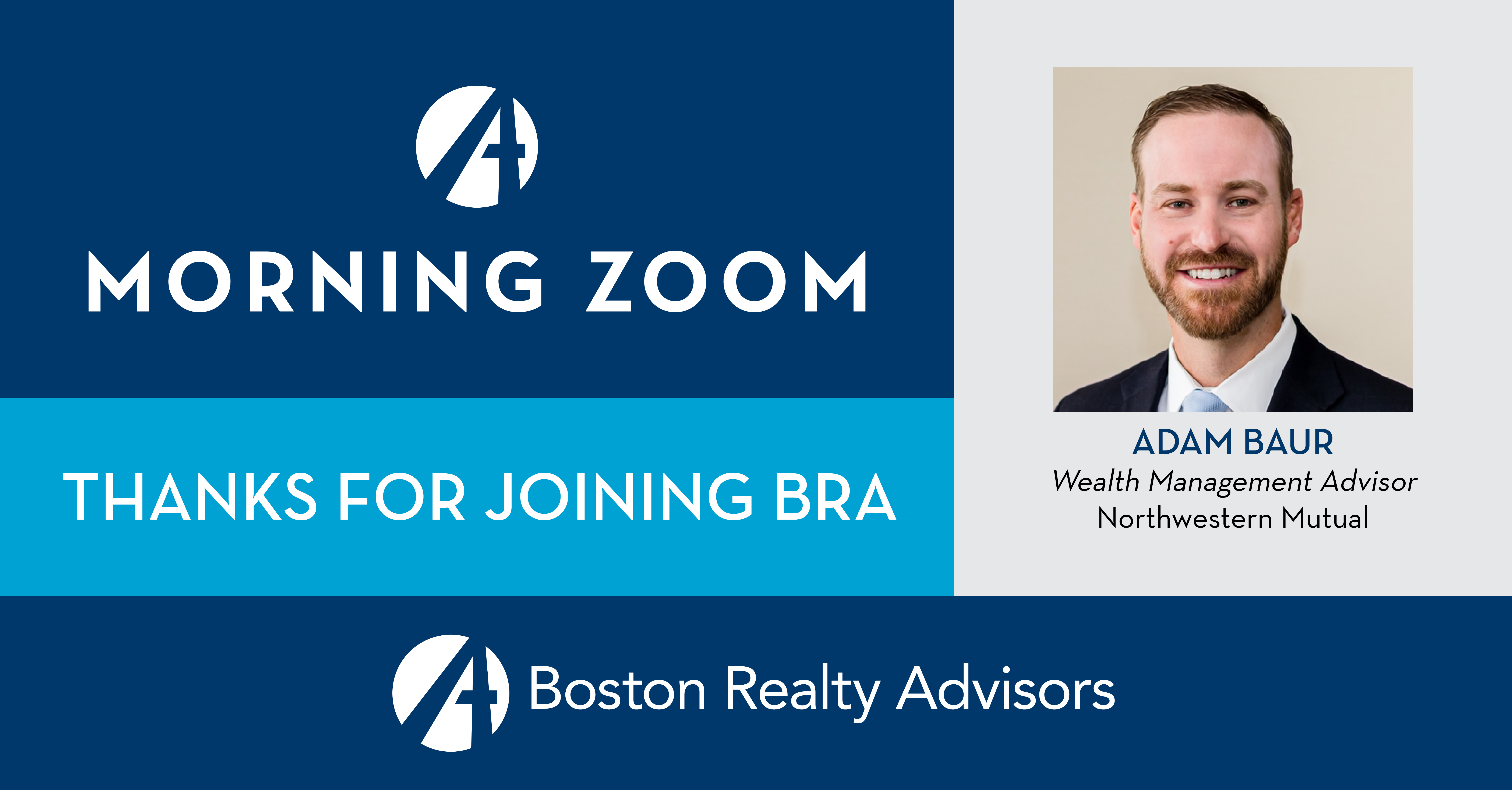
Adam Bauer has been with Northwestern Mutual for 15-years and leverages his company’s staying power of 160-years. Here are a few takeaways from his Morning Zoom with BRA.
- Adam shared his philosophy with the exclusive BRA audience, explaining that clients often approach him with an “Investment Strategy”. He dials it back and asks his clients to focus on their “Financial Plan”.
- He reminded folks about the important fundamental rule to save first and shared the company modo – Spend Your Life Living.
- Adam is a big believer is dollar cost averaging. He said not to overanalyze and to continue placing money into your financial plan.
- He is also a fan of the many fintech tools on the market, suggesting Northwestern’s app.
- Lastly, Mr. Bauer’s tip for the day was to leverage your network – friends from high school college buddies, previous coworkers, etc. Start by picking up the phone and asking, “How are you?”
Q&A OF THE DAY: “WHAT’S YOUR BIGGEST ASSET – YOUR HOUSE, CAR, OR MONEY IN THE BANK?”
None of the above. The answer is – Yourself and your ability to produce income. Invest in yourself.
0 Thank you Tom Tognoli for joining the BRA Morning Zoom
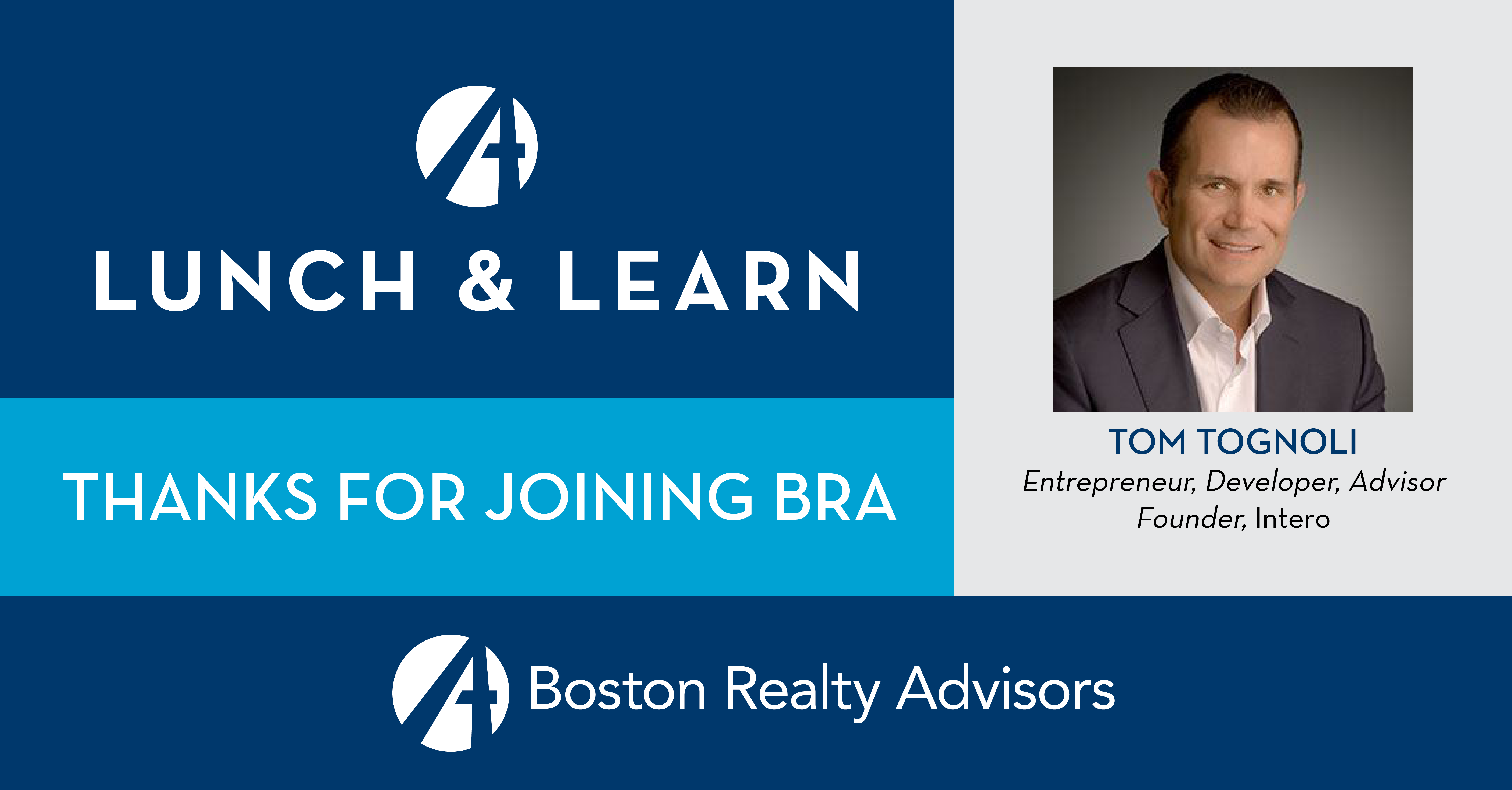
Tom Tognoli, real estate industry legend, joined BRA for a Lunch & Learn on Zoom. Mr. Tognoli was born and raised in Sunnyvale, CA. He still resides there and is hunkering down in his vacation home, located in Northstar Mountain – Lake Tahoe, CA.
- Tom began his 30-minute chat with a quick overview of his career. He began in 1988 and during the 08’ crash, he recognized that real estate agents yearned for leadership, culture and a workplace that they felt good about.
- He’s recruited and mentored thousands of brokers. His recommendation for today, “Don’t be stoic. You should take the time to cultivate relationships, be personal and show that you care. Being genuine is key – now more than ever.”
- Tom also recommended to take the time to analyze the trends. He said to watch what everyone else is doing – and do more to be different.
- He told the exclusive BRA audience that when you speak with clients, do not downplay the situation. Remind folks that there is never a bad time to buy real estate. There are just better times than others. He said that while the safe play is to sit tight and let the dust settle, he also said that today is still an excellent time to buy. While he admitted that pricing might come down, interest rates are still at historic lows. As the government dumps capital into the economy, Mr. Tognoli hinted that interest rates will ultimately rise again. He said that with a 7-10 year outlook, you’re fiscally better off buying today with great borrowing rates.
- Tom said that giving back is imperative. He said that now would be a great time to start the BRA Foundation, raise money internally and identify a need that is important to the entire organization.
- He concluded with telling the group that now is also a great time to reprioritize your life and recommended the following 5-point format.
- Faith
- Family
- Friends
- Diet & Exercise
- Money
0 Thank you Barry Sloane for joining the BRA Morning Zoom
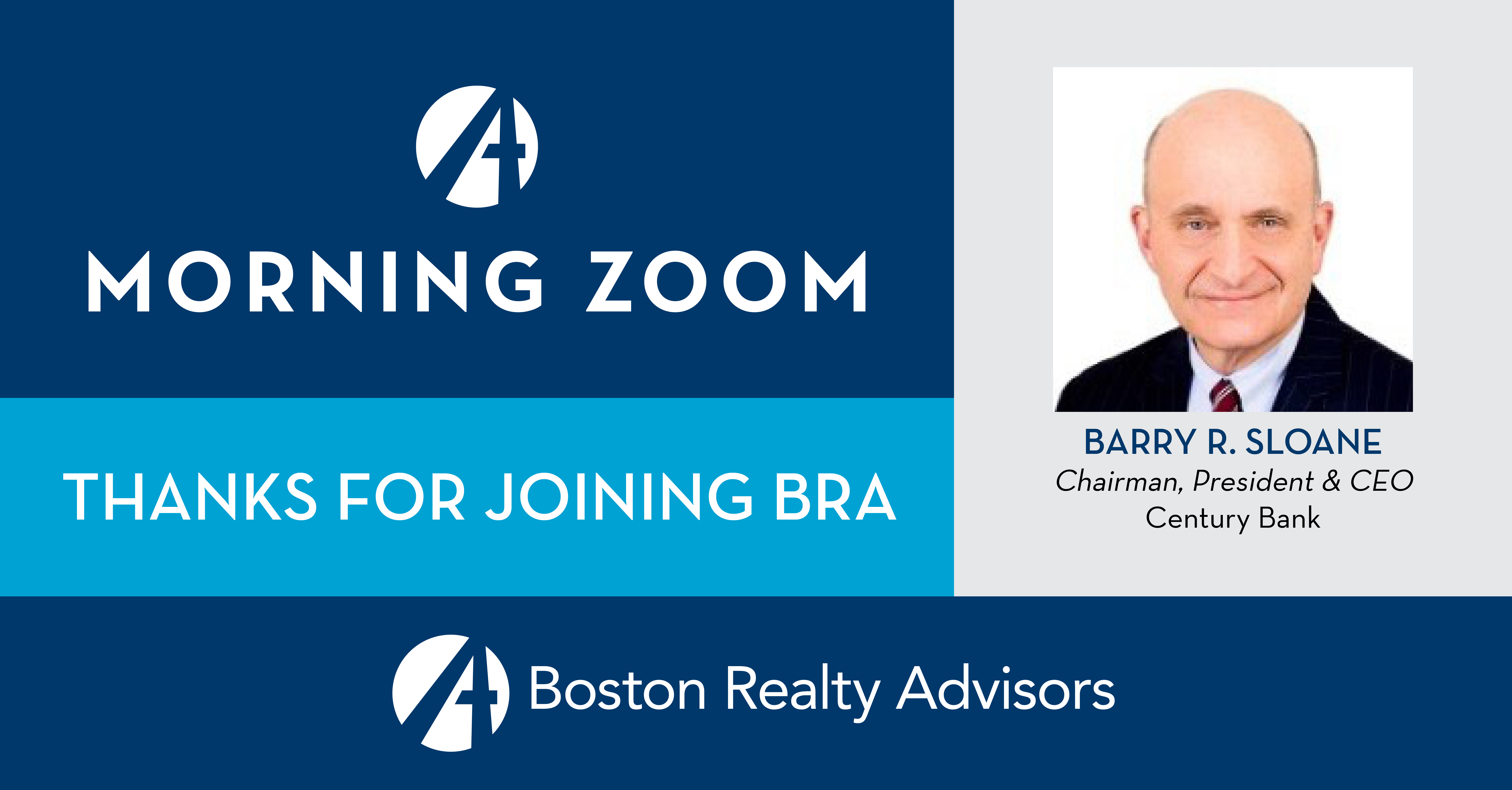
Barry Sloane explained that like most, Century Bank has been extremely busy. He said, “We’ve planned for redundancy and resilience. We’ve planned for numerous scenarios related to our facilities. However, we never planned for a pandemic and people not working. The safety of our staff has always been paramount. As such, we proceeded accordingly and with caution.”
- We were one of the first banks to close our lobbies.
- At the start of this, 15 of our 28 locations had Drive Through Banking. Not all locations are equipped with drive-throughs, but the ones that do have allowed us to close mortgages.
- People are seeking safety and soundness. As such, we’ve seen some retract from the equities market and place their money into the bank.
- Bank Mortgages – Century Bank granted a 3-month forbearance for anyone that requested. No questions and no qualifying paperwork.
- “Triple P SBA Loans” – Mr. Sloane reviewed the current parameters of the PPP program and emphasized that at Century Bank, the process is humanized; while at the SBA, the process is automated.
- We are fortunate to be very liquid and will likely arrange $250M of loans, with the ability to arrange over $1B.
- To date, we’ve processed over 500 applications, prioritizing our customers and also helping new customers.
- Barry reminded all on the zoom session that debt is the enemy and that people with cash on hand will be the big winners.
- As it relates to real estate deals, the bank president said that banks will not consider deals with hair on them for the foreseeable future.
- Barry was genuine saying that he does not want to be pessimistic, but will be realistic. He said that for now, “We are in a grace period and our future has been pinned to holidays.” He assessed those realities with the timing of getting back to business.
- Memorial Day – We will deal with short-term loss, that will ultimately become a distant memory.
- July 4th – Will become the largest recession of our collective lifetimes.
- Labor Day – We will need a comprehensive societal reset.
0 Thank you Eric Schlager from Bulfinch for joining the BRA Morning Zoom
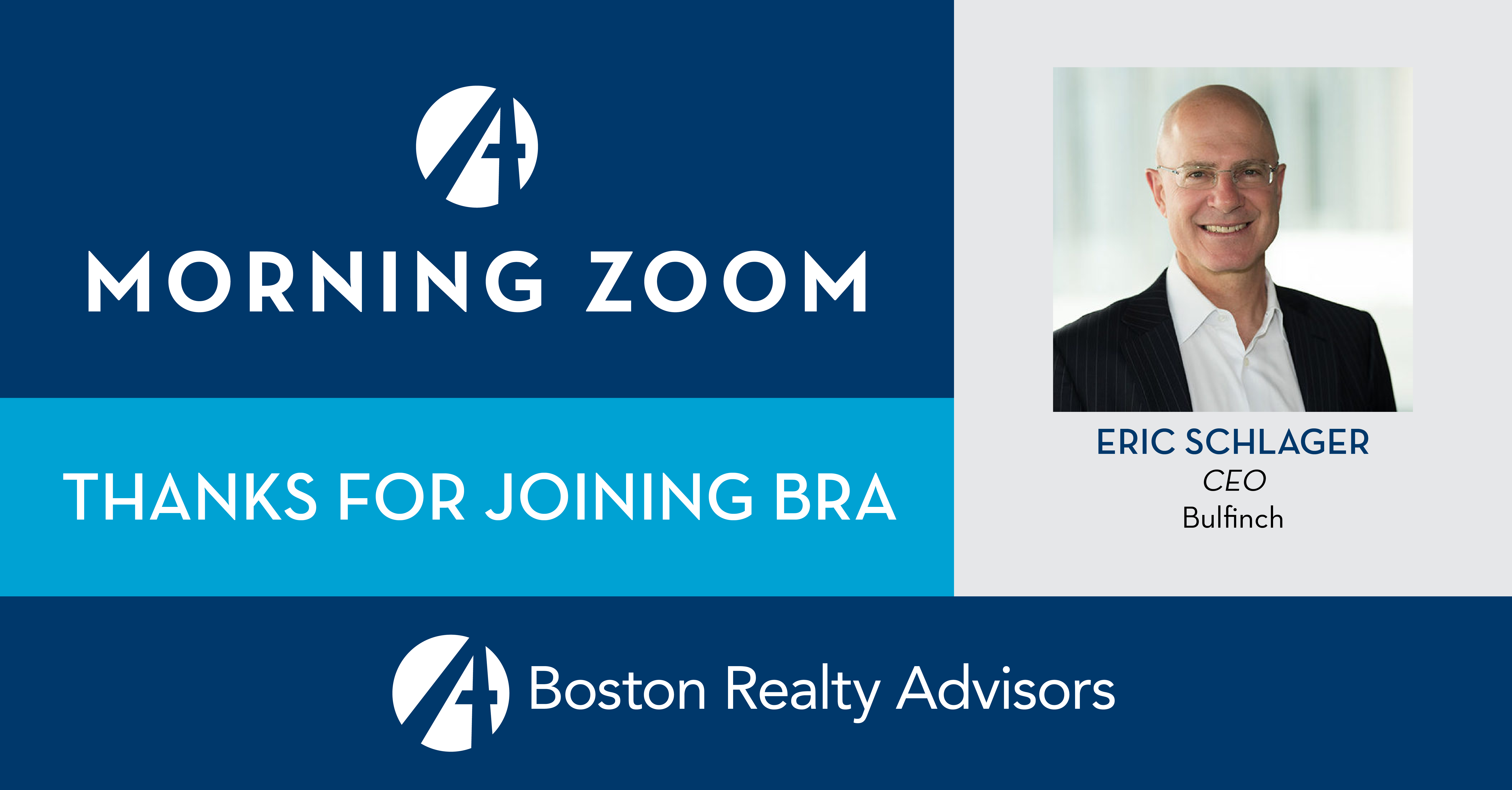
Thank you Eric Schlager from Bulfinch for joining the BRA Morning Zoom.
Key takeaways include:
- As a landlord, we are joined at the hip with our tenants and the same goes for our lenders.
- We all learn more in a downturn than during an upswing. The next four to six quarters will be a career defining moment. Stay focused and recognize new trends to come out of this with a competitive edge.
- Moving forward, one of the lessons learned is how much easier it would be to have all standardize leases and all EFT/ACH payment. We have many moving pieces right now, making collections a full time job.
- The country will experience a re-domestication of its supply chain. Real estate owners and operators will play a large role in the new American Industrialism.
- Every landlord in the world is in triage. Boston will have a soft landing because of the strength of the healthcare and life science industry.
- Bulfinch was founded in 1936. My family and I have seen a lot and recognize the challenges and opportunities that are ahead for all of us. I’m reminded by a Warren Buffet quote, “It’s always been a mistake to bet against America, since 1776. We take our body blows from time to time, but this country always comes through.”
0 Thank you Doctors, Nurses, Medical Staff, & First Responders for Keeping Our Communities Safe
Help to propel crisis response efforts, and direct critical resources to Doctors, Nurses, Medical Staff and First Responders fighting Covid19 on the front lines.
Please support our Health Heroes at the links below:

0 Thank you Noam Kleinman for joining the BRA Morning Zoom
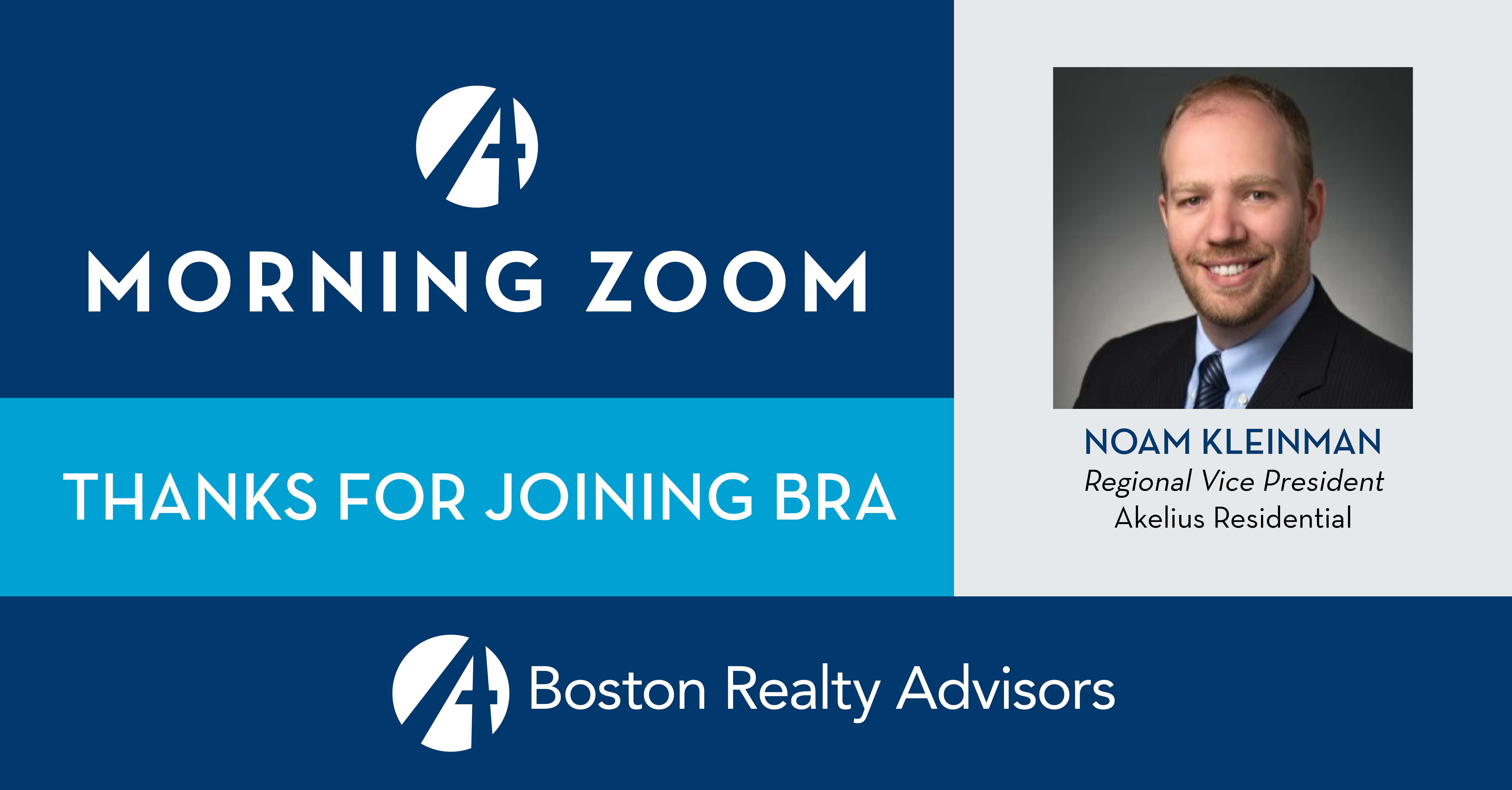
Thank you Noam Kleinman from Akelius Residential for joining the BRA Morning Zoom. Key takeaways include.
- We are flexible with tenants that need assistance.
- A lesson learned from 2008 is that banks do not want real estate assets.
- Just about every company is or will be dealing with cash flow issues. All will have to proceed accordingly.
- Preserve liquidity
- Risk management
- Analyze opportunities
0 Thank you Reese Beaton for joining the BRA Morning Zoom

Thank you Reese Beaton from Finance of America Mortgage for joining the BRA Morning Zoom.
The 30+ year veteran gave us an inside look of the mortgage scene during the pandemic and encouraged all to be strong.
